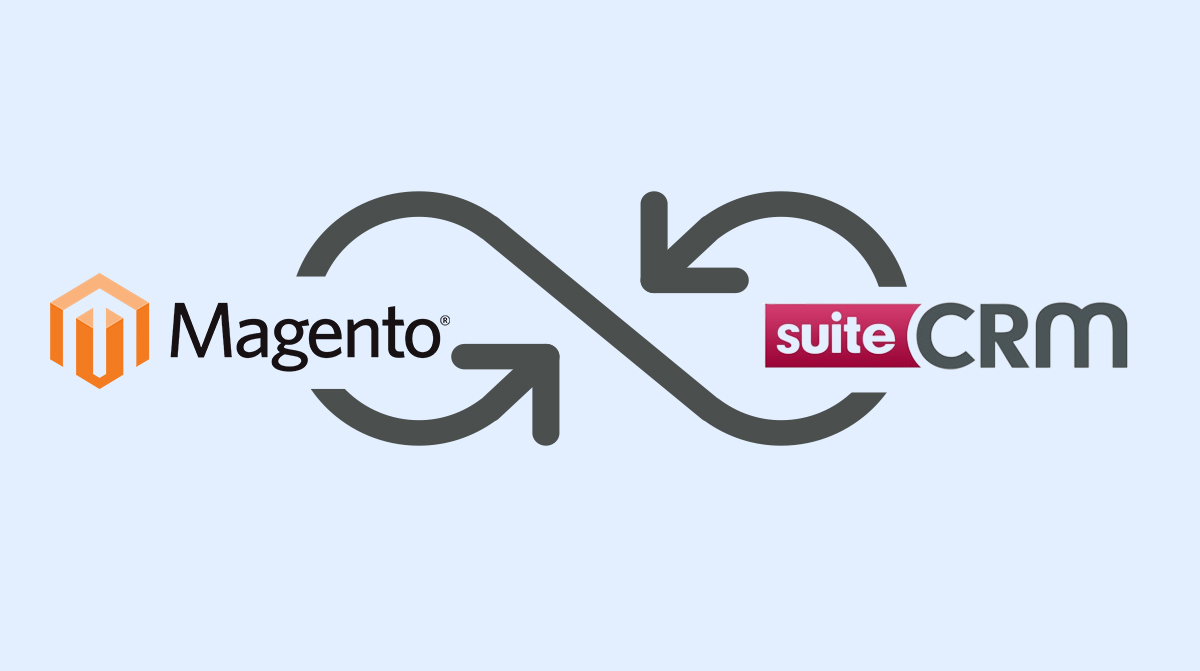In today’s fast-paced business landscape, customer relationship management (CRM) is crucial in driving sales performance and fostering lasting customer relationships. With the advent of mobile technology, the evolution of CRM solutions has taken a significant leap forward. Mobile CRM Solutions have revolutionized how sales teams operate, providing seamless access to crucial customer data and tools while on the go.
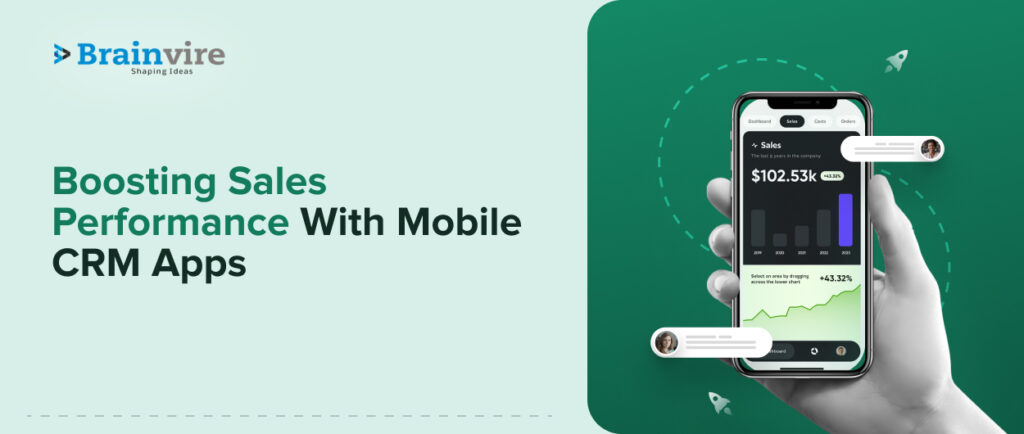
As technology evolves, businesses increasingly turn to mobile CRM apps to revolutionize their sales processes and gain a competitive edge. Mobile CRM apps empower sales teams with the flexibility and convenience of accessing critical customer data, managing leads, and staying connected while on the go, using their smartphones and tablets.
Let’s learn more about mobile CRM software solutions in the following sections.
Role Of CRM In Today’s Business Sphere
A mobile CRM app is a software application that enables customer relationship management functionalities on mobile devices like smartphones and tablets. It allows sales representatives to access essential customer data, manage leads, track interactions, and perform various sales-related tasks while on the go.

The mobile CRM app boosts sales performance by providing convenience and accessibility. Sales reps can access vital customer information anytime, anywhere, enhancing their preparedness during customer interactions and meetings. Additionally, the app facilitates improved communication and collaboration among team members and departments, leading to better coordination and faster response times.
Efficient lead management is another benefit, as the app streamlines lead tracking and nurturing processes, ensuring no missed opportunities. Furthermore, mobile CRM apps offer data-driven insights, empowering sales teams to make informed decisions and engage in personalized customer interactions, increasing sales success.
This article lists the numerous advantages of leveraging CRM mobile apps to enhance sales performance. From improved accessibility and real-time updates to streamlined lead management and data-driven decision-making, we explore the key features that enable sales teams to thrive in the dynamic business environment.
Benefits Of Mobile CRM: How It Revolutionizes Business Offerings!
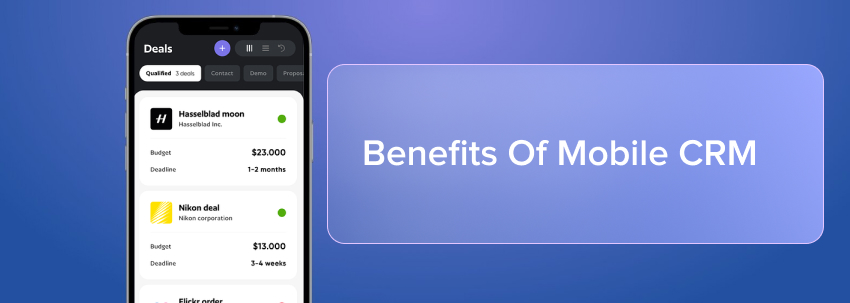
Mobile CRM (Customer Relationship Management) offers numerous benefits that empower businesses and sales teams to thrive in today’s dynamic and competitive market. Some key benefits of CRM mobile include:
Increased Accessibility: Mobile CRM provides access to customer data and sales tools anytime, anywhere. Sales representatives can access critical information, update records, and manage leads on their smartphones or tablets, even on the go or during client meetings.
Enhanced Productivity: Mobile CRM streamlines sales processes and automates repetitive tasks, freeing up time for sales teams to focus on building relationships and closing deals. This increased productivity leads to higher efficiency and better sales performance.
Real-time Updates: Mobile CRM apps offer real-time updates and notifications, ensuring sales representatives are promptly informed about new leads, customer inquiries, and sales opportunities. This allows for quick responses and timely follow-ups, improving customer engagement.
Improved Customer Engagement:

With mobile CRM solutions, sales reps have instant access to customer data and interaction history during meetings and interactions. This enables them to provide personalized and tailored recommendations, enhancing customer engagement and fostering stronger client relationships.
Data-driven Decision Making: Mobile CRM app provides valuable data analytics and insights, allowing sales teams to make data-driven decisions. Analyzing customer behavior and trends helps tailor sales strategies for more targeted and successful customer interactions.
If we look at it, mobile CRM offers many benefits, from increased accessibility and productivity to real-time updates, improved customer engagement, and competitive advantage. Embracing mobile CRM technology allows businesses to stay agile, respond to customer needs effectively, and drive growth in the modern business landscape.
How Mobile CRM Apps Enhance Sales Performance
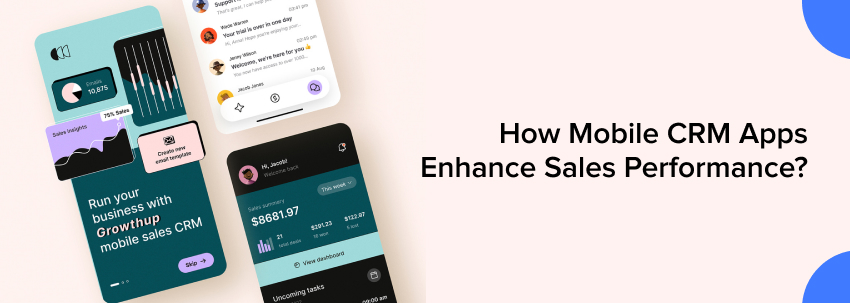
a. Accessibility and Convenience:
One of the primary advantages of mobile CRM apps is the access to customer data anytime, anywhere. Sales representatives no longer need to be tethered to their desks, as they can access vital information, such as customer profiles, purchase history, and interaction notes, on their smartphones or tablets. This convenience ensures that they are always prepared for meetings and customer interactions, leading to increased efficiency and improved customer satisfaction.
Furthermore, mobile CRM apps provide real-time updates and notifications, enabling sales teams to respond promptly to customer inquiries or requests. Whether an urgent email or a potential lead showing interest, mobile CRM informs sales reps, allowing them to act swiftly and capitalize on opportunities.
b. Improved Communication and Collaboration:
Effective communication and collaboration are crucial for successful sales teams. Mobile CRM apps facilitate seamless integration with other team members and departments, ensuring everyone is on the same page. Whether sharing customer insights, discussing strategies, or resolving issues, mobile CRM breaks down communication barriers and fosters teamwork.
Moreover, with mobile CRM, sales teams experience enhanced coordination and faster response times. The ability to share real-time information, updates, and leads enables sales reps to work together efficiently, ensuring that no opportunity is missed and customer needs are met promptly.
c. Efficient Lead Management:
Lead management plays a pivotal role in the sales process. Mobile CRM apps, furthermore, prove to be instrumental in streamlining this critical task. With these apps, sales representatives can effortlessly track and nurture leads as they progress through various sales pipeline stages. The inclusion of automated lead tracking and nurturing features in mobile CRM apps significantly simplifies repetitive tasks, thereby enabling sales teams to redirect their focus towards fostering relationships and effectively closing deals.
Automation of sales processes within elead CRM mobile also minimizes the chances of errors, ensuring that no lead falls through the cracks. This increased efficiency leads to a more productive sales force and a higher conversion rate.
d. Data-driven Decision Making:
Data-driven decision-making is the cornerstone of modern sales strategies. Mobile CRM apps provide accurate and up-to-date sales data analytics, empowering sales teams with valuable insights. By analyzing customer behavior, sales trends, and other relevant data, sales reps can tailor their approach for personalized customer interactions.
These data-driven insights enable sales representatives to understand customer preferences, pain points, and buying behaviors, leading to more targeted and effective sales pitches. Ultimately, it enhances the overall customer experience and builds stronger, long-lasting relationships.
e. Enhanced Customer Engagement:
With mobile CRM apps, sales reps have instant access to customer data and interaction history during meetings and interactions. This enables them to provide personalized and tailored recommendations, improving customer engagement and strengthening client relationships.
f. Increased Productivity and Time Management:
Mobile CRM apps streamline various sales processes and automate repetitive tasks, freeing up sales reps’ time to focus on core sales activities. Increased productivity increases efficiency and enables sales teams to handle more leads and customer interactions effectively.
g. Agility and Adaptability:
Mobile CRM apps empower sales representatives to adapt quickly to changing market conditions and customer needs. With real-time data and insights, sales teams can adjust their strategies promptly, stay ahead of competitors, and seize emerging opportunities.
h. Real-time Updates and Notifications:
Mobile CRM apps offer real-time updates and notifications, keeping sales reps informed about new leads, customer inquiries, and sales opportunities as they happen. These timely notifications enable sales teams to respond promptly, capitalize on opportunities, and ensure no lead or customer engagement goes unnoticed.
Why Mobile CRM Apps are Essential for Sales Teams?
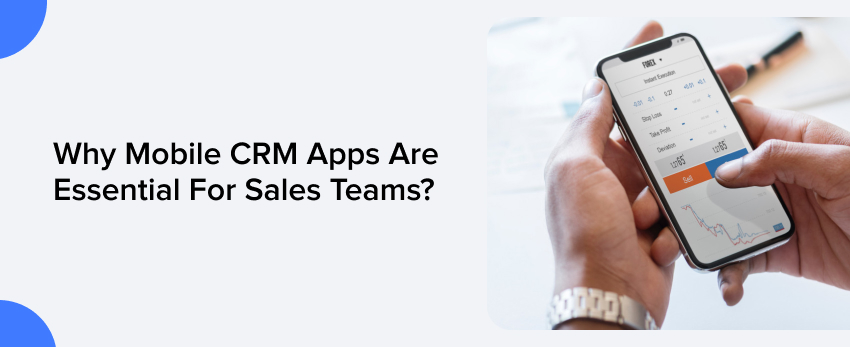
a. Increasing Remote and Field Sales:
The modern business landscape has witnessed a significant rise in remote work and flexible work arrangements. Sales teams, in particular, have embraced the idea of working from anywhere, allowing them to be closer to clients and explore new markets.
Mobile CRM apps cater to the growing need for on-the-go sales capabilities. Sales reps can access vital customer data and sales tools, conduct meetings, and manage leads without being tied to a physical office. This increased flexibility and mobility contribute to a more agile and efficient sales force.
b. Changing Customer Expectations:
Customer expectations have evolved, driven by the rise of digital technology. Customers now expect personalized and timely interactions with businesses. Mobile CRM apps empower sales representatives to meet these expectations.
During customer meetings, sales reps can instantly access essential customer information, including previous interactions, purchase history, and specific preferences. This level of preparedness impresses customers, enhances engagement, and instills a sense of trust, ultimately leading to increased sales success.
c. Competitive Advantage:
In a digital-first business landscape, gaining a competitive edge is vital. Mobile CRM apps give businesses an advantage by enabling their sales teams to be more responsive and proactive.
With instant access to real-time data, sales representatives can quickly adapt their strategies to changing market trends and customer preferences. This agility allows businesses to stay ahead of the competition and seize emerging opportunities.
Moreover, mobile CRM apps contribute to a more data-driven approach, empowering sales teams with valuable insights that inform their decision-making process. This data-driven approach allows businesses to make informed choices, optimize their sales processes, and drive growth.
d. Efficient and Streamlined Sales Processes:
Mobile CRM apps streamline and automate various sales processes, increasing efficiency and productivity. From lead management to tracking sales activities, mobile CRM apps eliminate manual and repetitive tasks, freeing up valuable time for sales reps to focus on building relationships and closing deals.
e. Enhanced Customer Engagement:
Mobile CRM apps enable sales representatives to engage customers more personalized and meaningfully. By accessing customer data and insights, sales teams can tailor their interactions, offer relevant solutions, and address customer needs more effectively. This personalized approach strengthens customer relationships and fosters loyalty.
f. Real-time Collaboration and Communication:
Mobile CRM apps facilitate seamless communication and collaboration within sales teams and departments. Team members can share real-time information, updates, and sales-related data, enabling better coordination and faster response times to customer inquiries or issues.
What To Look For In A Mobile CRM App?
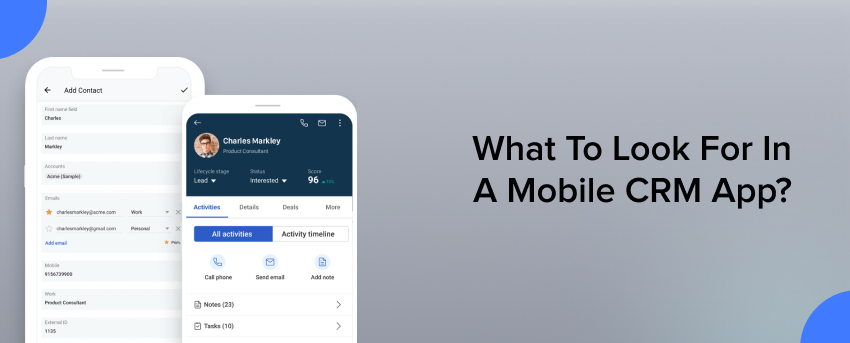
As the popularity of mobile CRM apps continues to grow, businesses must choose the right solution that aligns with their specific needs. Here are some essential factors to consider when selecting a mobile CRM app:
a. User-friendly Interface and Navigation:
A mobile CRM app should be intuitive and easy to use, even for users who are not tech-savvy. A well-designed interface and straightforward navigation contribute to user adoption and efficiency.
b. Integration Capabilities with Existing Tools and Systems:
A mobile CRM app should seamlessly integrate with the existing CRM platform and other essential business tools. This integration ensures a smooth flow of data and avoids duplication of efforts.
c. Customization and Scalability Options:
Every business has unique requirements, and a mobile CRM app should offer customization options to adapt to those needs. Additionally, it should be scalable to accommodate future growth and changing business demands.
d. Robust Security Measures:
Data security is of utmost importance when dealing with customer information. The mobile CRM app should employ robust security measures to safeguard sensitive data and protect against unauthorized access.
e. Offline Access Functionality:
The mobile CRM app should have offline access functionality when internet connectivity is limited. Sales reps should be able to access critical customer data and perform essential tasks even when not connected to the internet.
f. Mobile Device Compatibility:
Check that the app is compatible with various mobile devices and operating systems (iOS, Android, etc.) used by your sales team. Compatibility ensures a smooth experience across different devices.
g. Real-time Updates and Notifications:
Real-time updates and notifications inform sales reps about important events, such as new leads, customer inquiries, or upcoming appointments, enabling quick responses and better customer engagement.
h. Data Analytics and Reporting:
Look for an app with data analytics and reporting features, allowing your sales team to gain valuable insights into sales performance, customer behavior, and trends. Data-driven insights enable better decision-making and targeted sales strategies.
i. Training and Support:
Consider the availability of training and support from the app provider. Adequate training ensures that your sales team can utilize all the app’s features effectively, while ongoing support helps address any technical issues or questions that may arise.
Some Best Practices For Implementing CRM Into Sales
Define Objectives and Goals: Clearly outline the objectives and goals you want to achieve with the mobile CRM app implementation. Identify key performance indicators (KPIs) to measure success, such as increased sales productivity, improved customer satisfaction, or higher conversion rates.
Involve Stakeholders: Involve all relevant stakeholders, including sales representatives, managers, Hire IT teams, and customers, if possible. Gather feedback and insights from the end-users to understand their needs and preferences, which will help tailor the app to suit their requirements.
Choose the Right App: Select a mobile CRM app that aligns with your sales team’s needs and seamlessly integrates with your existing CRM platform and other tools. Consider factors like user-friendliness, customization options, scalability, and data security.
Provide Training and Support: Offer comprehensive training and support to the sales team to ensure they understand how to use the mobile CRM app effectively. Address any concerns or questions they may have during the onboarding process.
Data Migration and Integration: Plan a smooth data migration from your current CRM system to the mobile CRM app. Ensure that data integration is seamless and there are no discrepancies during the transition.
Encourage Adoption: Encourage and incentivize sales representatives to embrace the new mobile CRM app. Highlight its benefits, such as improved efficiency, better data access, and enhanced customer interactions.
Monitor and Evaluate: Continuously monitor the app’s performance and gather feedback from users to identify any areas of improvement. Analyze the KPIs set in the initial stages to assess the app’s impact on sales performance and customer relationships.
Data Security and Compliance: Pay close attention to data security measures to protect sensitive customer information. Ensure that the mobile CRM app complies with relevant data privacy regulations.
By following these considerations and best practices, you can ensure a successful implementation and integration of mobile CRM apps into your existing sales processes and systems. This will enhance sales efficiency, improve customer relationships, and greater business success.
Conclusion
In today’s dynamic business landscape, mobile CRM apps have emerged as indispensable tools for enhancing sales performance. They offer accessibility, convenience, and real-time capabilities, empowering sales teams to be more efficient, responsive, and customer-centric. Given the increasing importance of remote work and changing customer expectations, these apps are advantageous and essential for staying competitive.
Businesses looking to boost their sales performance should carefully consider a mobile CRM app’s features, integration capabilities, and security measures before implementation. By harnessing the power of mobile technology and data-driven insights, sales teams can build stronger customer relationships, improve decision-making, and thrive in the digital-first era.
In conclusion, mobile CRM apps have become essential for sales teams because they can support remote and field sales, meet evolving customer expectations, provide a competitive edge, streamline sales processes, enhance customer engagement, and foster real-time collaboration. Embracing mobile CRM technology empowers sales teams to stay ahead in the ever-changing business landscape and achieve greater success in their sales endeavors.
[You may like to read: How Can CRM Be Used For Business Purposes?]
FAQs
A mobile CRM sales application can run beyond computers and desktops. It is a sales application that can run on Android and iOS devices such as iPads, iPhones, and Android phones, allowing business owners to access their operations across multiple devices in real-time.
It offers some or all of the modules and features in a cloud-based web CRM application. Furthermore, as businesses explore the vast array of mobile CRM app options available, we provide valuable insights on what to consider when selecting the ideal app for their unique requirements. User-friendly interfaces, integration capabilities, customization options, scalability, and security measures are vital to ensure seamless and effective integration into existing sales processes and systems.
The key advantages of using mobile CRM apps for sales teams include:
– Enhanced accessibility and convenience.
– Allowing any time.
– Anywhere access to customer data and real-time updates.
Improved communication and collaboration among team members and departments streamline sales processes. Efficient lead management through automated tracking and nurturing ensures no leads are overlooked. Data-driven insights empower sales reps for personalized customer i
Certainly, mobile CRM apps, in various ways, improve sales productivity and efficiency. For instance, on the go, sales representatives can access customer data and sales tools, leading to better-prepared customer interactions. Prompt follow-ups are enabled by real-time updates and notifications, while streamlined lead management ensures no potential sales opportunities slip through the cracks. Additionally, empowered by data-driven insights from mobile CRM apps, sales teams can tailor their approaches. These capabilities, in turn, enhance overall sales productivity and efficiency, leading to higher sales success rates and improved customer satisfaction.
Mobile CRM apps streamline lead management processes, automating lead tracking and nurturing tasks. Sales reps can quickly update lead status, set follow-up reminders, and track progress through the sales pipeline. This efficient lead management ensures that potential sales opportunities are not overlooked and improves the overall sales conversion rate. Many mobile CRM apps offer offline access functionality, enabling sales reps to continue working without an internet connection. This feature is particularly useful during travel or in areas with limited connectivity, ensuring sales productivity is not hampered.
When selecting a mobile CRM app for your sales team, key features and functionalities to look for include a user-friendly interface and navigation for easy adoption. Integration capabilities with existing tools and systems ensure smooth data flow. Customization options and scalability allow alignment with specific business needs and future growth.
Robust security measures protect sensitive customer data. Offline access functionality enables seamless work in areas with limited internet connectivity. These features together ensure a seamless and efficient mobile CRM experience, empowering your sales team with the tools they need to drive success in the dynamic business landscape.
Mobile CRM apps help sales teams stay organized and manage customer relationships effectively by providing seamless access to customer data and interaction history on the go. Sales representatives can easily update and access essential information during meetings, enhancing their preparedness and responsiveness.
Automated lead management streamlines tracking and nurturing, ensuring no opportunities are missed. The app’s real-time updates and notifications enable prompt follow-ups and better customer communication. With data-driven insights, sales teams can personalize interactions and make informed decisions, leading to stronger customer relationships and increased sales success. Overall, mobile CRM apps empower sales teams to stay organized, efficient, and customer-centric in their approach.
Implementing and integrating mobile CRM apps into existing sales processes and systems requires careful planning and consideration to ensure a smooth transition and maximize the benefits. While you’re at it, ensure that you monitor, evaluate, and have aligned all your requirements with the functionalities of the CRM application.
Related Articles
-
Integration of Adobe Commerce Cloud and Odoo POS for an Omnichannel Experience
As technology improves, we find more and more ways to use it in our everyday lives. As a result, the barriers between what we do online and in real life
-
Best Real Estate ERP and CRM Platforms To Use in 2025
In 2025, real estate businesses will increasingly use advanced ERP (Enterprise Resource Planning) and CRM (Customer Relationship Management) systems to streamline operations, manage customer relationships, and boost profitability. These platforms
-
Magento Bridge – The Unbreakable Bond Between Magento & SuiteCRM Users
The growing needs of eCommerce businesses and the dynamic shifts in consumer expectations have contributed towards the rise of Enterprise Application Integration. These integrations are the foundation of a true




